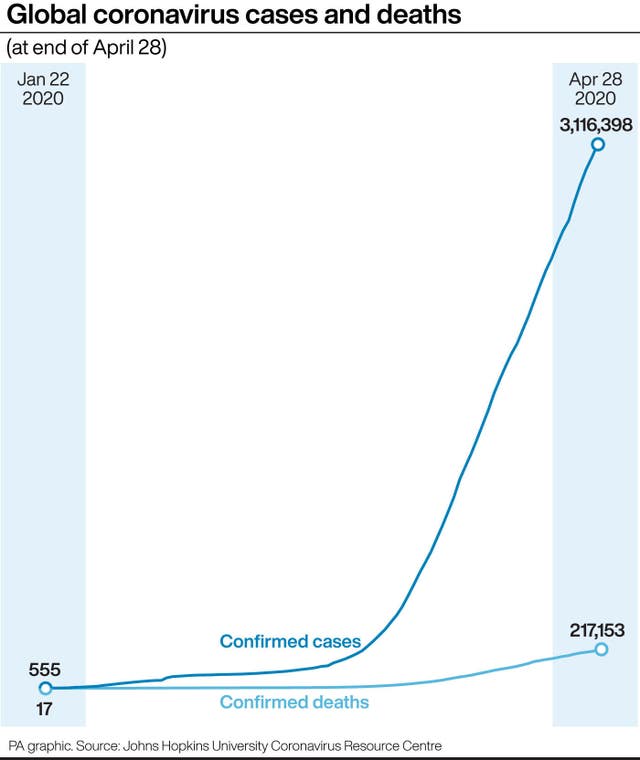US economy shrinks as European nations seek to ease coronavirus restrictions
The GDP decline in the January-March quarter was the sharpest quarterly drop since the Great Recession in 2008-09.

The US economy has shrunk by almost 4.8% as countries around the world seek ways to ease coronavirus restrictions and allow businesses to reopen.
The GDP decline in the January-March quarter was the sharpest quarterly drop since the Great Recession in 2008-09.
More pain is expected this quarter, as the Congressional Budget Office has estimated GDP will plunge at a 40% annual rate during the three-month period that ends in June.
The United Nations’ main labour body raised its prediction of full-time-equivalent job losses in the second quarter to an estimated 305 million.

That is nearly half the global workforce of 3.3 billion people.
In Paris, aircraft maker Airbus reported a first-quarter loss of 481 million euros, laid off thousands of workers and sought billions in loans to pull through the crisis.
Ratings agency Fitch cut Italy’s government debt rating — the first downgrade to a major economy — in a reflection of the damage done by the lockdowns.
The agency lowered the country one notch to BBB-, just one level above junk bond status. It expects the outbreak to shrink the Italian economy by 8% this year.
Germany’s economy minister said the government is projecting a contraction of about 11% in GDP by the end of the current quarter but he also predicted a sharp recovery in 2021.

The Dutch national railway began bringing longer trains back into service to make it easier for passengers to stay apart.
The capacity of Milan’s metro system will be slashed to just 350,000 passengers a day, compared with 1.3 million on normal workdays. Mayor Giuseppe Sala is calling for staggered working hours and more working from home to help deal with the cutbacks.
Around the world, confirmed infections stood at more than 3.1 million — including 1 million in the US — and the confirmed global death toll topped 217,000, according to a tally by Johns Hopkins University.
The true toll is believed to be much higher because of limited testing, differences in counting the dead and concealment by some governments.

He insisted that the United States was doing enough testing to protect Americans re-entering the workforce.
The administration has been sharply criticised for not overseeing widespread testing but Mr Trump said no amount would ever be good enough for critics in the media.
The president dismissed suggestions that the administration was slow to respond to the threat of Covid-19, including reports that it was mentioned in his daily intelligence briefing in January and February.
With South Koreans about to celebrate their longest holiday since infections there surged in February, authorities urged people to think twice about travelling and to continue to wear masks, not share food and stay home if they are feeling sick.
“We must not let a moment of carelessness trigger mass transmissions that would make the efforts we invested so far vanish like bubbles of water,” vice health minister Kim Gang-lip said.
In China, where the virus first emerged late last year, the government announced that its ceremonial parliament will be held late next month after its original meeting was postponed. The convening of the full session will involve 3,000 members.
In Japan, officials asked people not to travel during the country’s upcoming Golden Week holiday.





